Posts From Spain
Salvador Dali Part I (Figueres, Spain)
Journal entry for Saturday 25th Mar, 2017 (day 11, miles 70,577)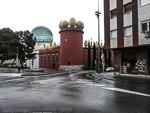
The Spanish town of Figueres is famous as the location of the Dail Theatre Museum. As the name implies this is an old theater building that was converted (by Dali) into a museum to display various of Dali's works. Visiting this museum and soaking up some Dali atmosphere was our plan for today.
...click/tap to read the full postSalvador Dali Part II (Figueres, Spain)
Journal entry for Sunday 26th Mar, 2017 (day 12, miles 70,577)
Dali was born in Figueres and lived much of his life in the nearby village of Port Lligat where, over the years, he combined and converted a total of 7 cottages into an elaborate and some what eccentric house. That house is now a major tourist attraction. A visit requires a pre- purchased ticket, lasts only an hour, and all visits are supervised. To visit this house one must travel to the village of Cadaques then find ones way the extra 1 km to Port Lligat.
...click/tap to read the full post3 Estrellas (Barcelona, Spain)
Journal entry for Monday 27th Mar, 2017 (day 13, miles 70,680)
Just a short hop today of about 100 kms to Barcelona and we hope a camping spot from which we can base ourselves for 4-5 days while we explore the city and its attractions. The motorway south from Figueres was pretty easy to find and follow until we got into the complex of roads around and through Barcelona and then it was very helpful to have a co-pilot and a GPS/SATNAV each and to know that our intended campground was south of the city near the airport. That meant that at the numerous merging and separation of motorways if all else failed we could simply follow the airport sign.
...click/tap to read the full postOn-off Bus (Barcelona, Spain)
Journal entry for Tuesday 28th Mar, 2017 (day 14, miles 70,680)
Today was proof that plans are made to be changed. We set off this morning with the intention of visiting a couple of the major sights but one look around Plaça Catalunya at the number of people we decided we should probably spend the day getting the lay-of-the-land and make sure on subsequent days we got tickets in advance. The wisdom of this decision was confirmed later in the day as by 12:00 there was a 4-5 hour delay for tickets at most major tourist venues. Thus we spent the day getting on-off one of the tourist buses. The photographs below show glimpses of various land marks.
...click/tap to read the full postSagrada Familia (Barcelona, Spain)
Journal entry for Wednesday 29th Mar, 2017 (day 15, miles 70,680)
Last night we bought tickets online for an 11:30 entry to Sagrada Familia and because of an early start got tickets at the entrance for a 9:00 visit to Casa Milá (La Pedrera). La Pedrera was built in 1906 as an apartment building for a newly married couple Pere and Roser Milá. The Milás planned to occupy the ground floor and rent the other apartment floors, apparently a common practice at the time. There are many notable features of this building, too many to remember without extensive study. But the three that struck me are:
...click/tap to read the full postParc Güell (Barcelona, Spain)
Journal entry for Thursday 30th Mar, 2017 (day 16, miles 70,680)
Another day on our feet being a tourist in Barcelona. After yesterdays effort we were both very tired and it was only after consulting Nina's Apple watch that we understood why. Well over 25,000 steps and 9+ miles. Maybe I am getting too old for this. But regardless of that we went back into Barcelona for another dose today.
...click/tap to read the full postCasa Batlló (Barcelona, Spain)
Journal entry for Friday 31st Mar, 2017 (day 16, miles 70,680)
Back into the city this morning for another Gaudí building, another apartment complex called Casa Batlló, though in fact this building was only renovated (not constructed) by Gaudí for Josep Batlló. Like other Gaudí buildings there are numerous features of interest, roof fixtures to hide chimneys and air ducts, light well, attic area for services like laundry, but key theme of this building remodel is the ocean like curves and colors throughout the building.
...click/tap to read the full postMiro and the Olympic Complex (Barcelona, Spain)
Journal entry for Saturday 1st Apr, 2017 (day 18, miles 70,680)
We decided to work independently today. Nina went back into Barcelona to add to her tourist experience with a visit to the Museum of Joan Miro while I stayed in camp and caught up on some business and other chores. In addition since the weather was not great, there being clouds and some rain, we decided that this entry would not only cover Miró but also some of the other parts of Barcelona that have not previously been discussed. Specifically the Olympic venues on Mountjüic (which is also where the Miró Gallery is situated) and the harbor.
...click/tap to read the full postMotorway west (El Frasno, Spain)
Journal entry for Sunday 2nd Apr, 2017 (day 19, miles 70,908)
Today we headed west eventually towards the city of Salamanca. Initially our route took us south along the coast past what looked like affluent holiday destinations and an area known as Stiges and then onto the AP-2 a toll charging Motorway that links the coast to the inland city of Zaragoza. Past Zaragoza we diverted to the A-2 still a motorway quality road but now without tolls. It was a very pleasant day. Bright sunshine, exceedingly light traffic, and picturesque country side that seems to be given over almost entirely to agriculture while regularly dotted with quaint little villages.
...click/tap to read the full postVillage and churches (Salamanca, Spain)
Journal entry for Monday 3rd Apr, 2017 (day 20, miles 71,179)
Today we decided to venture off roads of motorway quality onto national-highway standard roads, so at Calatayud we turned NW onto the N-234 towards Soria and eventually Valladolid and then back onto motorways into Salamanca. The N234 turned out to be a good choice with lots of small villages this time with the road going right through the middle rather than bypassing as was the case yesterday on the motorway. We discovered that every village has at least one church (some times more) that seems to be much larger than could be justified by the size of the village and that many of those churches (and also many electrical poles) have their own resident Stork and brood.
...click/tap to read the full postA little sightseeing (Salamanca, Spain)
Journal entry for Tuesday 4th Apr, 2017 (day 21, miles 71,179)
Salamanca is an old city having been besieged by Hannibal in the 3rd century BC. It has the third oldest continuously operating university in the world, the Universidad de Salamanca, founded in 1134. It (Salamanca) is famous for its two cathedrals, the new cathedral, Catedral Nueva, and the old cathedral Catedral Vieja de Santa María. The old cathedral was founded in the 12th century and completed in the 14th. The new cathedral was started in 1513 and completed in 1733. So one can see that stuff has been happening around here for a long time.
...click/tap to read the full postNina's excursion (Salamanca, Spain)
Journal entry for Wednesday 5th Apr, 2017 (day 22, miles 71,179)
I sometimes get a bit bored with the historical tourist stuff so today I decided to stay at the campground and be a slug while Nina undertook another excursion into Salamanca. This time her aim was to visit that old University. Along the way she picked up some interesting pieces of historical trivia regarding the building that surrounds the main square. In the past (unspecified) students attending the University rented rooms in that building. These rooms had unique entertainment value as the local bull fights and torture sessions of the Inquisition could be watched without the students needing to leave their rooms.
...click/tap to read the full postRobert's f....k up (Toledo, Spain)
Journal entry for Thursday 6th Apr, 2017 (day 23, miles 71,327)
Well, we got off to a bad start this morning. Out first chore of the morning was emptying our waste water tanks at the campground sani-dump. Unfortunately I failed to notice a short concrete wall beside the dump area and as I pulled out of the dump the right hand side of the truck collided with that wall and completely destroyed the camper stairs and almost completely removed the storage box behind the stairs. That left the vehicle in an un-drivable condition so we spent the next 2-3 hours removing the damaged step assembly from the vehicle and finding a way to carry the damaged storage box on the rear carrier beside the spare tire. The real bad news of this event is that there is some significant damage to the actual camper body in the vicinity of the stair well and that will require some professional repair at some point in the nearish future. In the interim I will seal it with silicon and duct-tape in the hope of preventing water entry.
...click/tap to read the full postHoly Toledo (Toledo, Spain)
Journal entry for Friday 7th Apr, 2017 (day 24, miles 71,327)
I woke with the early symptoms of a cold this morning so somewhat to Nina's displeasure decided to spend that day in bed in the hope of accelerating its progress. I guess this is the price of catching public transport in recent days where one is exposed to people coughing and spluttering. Regardless of my absence Nina seemed to have a good day exploring the city and came home with lots of information about this picturesque World heritage city that was once the capital of Spain.
...click/tap to read the full postMuseo del Ejército (Toledo, Spain)
Journal entry for Saturday 8th Apr, 2017 (day 25, miles 71,327)
Today I joined Nina for a day touring Toledo. For her some of the day was a repeat of yesterday but she seemed to enjoy showing me all the things she had discovered. However we started the day with a visit to the Alcazar and the Spanish Army Museum (Museo del Ejército) which was not on Nina's itinerary yesterday . The Alcazar is the iconic building with 4 towers situated on the highest point of the city. In one form or another it dates back to Roman times. More recently however it was the scene of a major battle of the Spanish civil war when a group of Nationalists were besieged in the Alcazar by an overwhelming force of Republicans. The museum itself had a fine collection of old weapons and military odds and ends but without a much better knowledge of Spanish history I found it a bit disjointed.
...click/tap to read the full postTo Madrid by train (Toledo, Spain)
Journal entry for Sunday 9th Apr, 2017 (day 26, miles 71,327)
Today we took an excursion into Madrid and will find a hotel for the night and return to Toledo tomorrow. We simply did not want the hassle of trying to find a camping spot in the Madrid metroplex, and once we learned that there was a fast train available that covered the 46 miles in 30 minutes (maximum speed 270 km/h or 168 mph) and cost only Euro 12.50 per person the deal was done. So why Madrid ? For us ( or should I say Nina the culture fiend ) the big attractions were the National Palace (Palacio Real), Guernica exhibition in the Centro de Arte Reine Sofia and the Prado.
...click/tap to read the full post... and return (Toledo, Spain)
Journal entry for Monday 10th Apr, 2017 (day 27, miles 71,327)
We spent yesterday and last night in the "old" section of Madrid with its historic and artistic attractions. So we decided that this morning we would catch a bus up-town to modern Madrid with skyscrapers and modern commercial buildings. Again we are amazed at the price of transport. This 30 minute bus ride was one euro each.
...click/tap to read the full postA pleasant drive (Cordoba, Spain)
Journal entry for Tuesday 11th Apr, 2017 (day 28, miles 71,535)Mezquita (Cordoba, Spain)
Journal entry for Wednesday 12th Apr, 2017 (day 29, miles 71,535)
The big attraction in Cordoba is the Mezquita. The Mezquita is a very large and impressive Islamic Mosque with over 800 column supporting the roof. It was built in the 10th century when Cordoba was the greatest city in Europe rivaling Constantinople and Baghdad. Following the Christian reconquest of Cordoba in 1236 part of the Mezquita was converted to a Christian Chapel requiring the removal of 16 columns. Later, in the 15th century, a massive Christian (Catholic) Cathedral was created inside the Mezquita. To facilitate this conversion a more of the original column were removed and the original minaret transformed into a bell tower. Significantly the mosque was not destroyed by the christians during or after their reconquest. Today over 70% of the original mosque structure still remains.
...click/tap to read the full postOlive day, to Granada (Granada, Spain)
Journal entry for Thursday 13th Apr, 2017 (day 30, miles 71,658)
I mentioned in a previous post that the campground Carlos iii was a bit tight for us due to the mulberry trees. Well it got a lot tighter over the past couple of days as a group of Italian motor-homers arrived yesterday and have filled all the spots around ours. So when it came time to leave this morning there was no room near us for negotiating our way out. In the end I had to reverse between trees and camper vans around 3 corners with literally inches to spare on either side. We have definitely discovered that the correct dimensions for a motorhome in Europe is NOT 7.9meters L x 2.4 meters W x 4.0 meters H.
...click/tap to read the full postFirst look around Granada (Granada, Spain)
Journal entry for Friday 14th Apr, 2017 (day 31, miles 71,658)
Mid morning we caught the local bus into the downtown area of Granada with the plan of getting our first view of the city and getting our head around "the lay of the land". We also planned on picking up our ticket to the famous Alhambra which we had previously ordered online. The first thing we noticed once off the bus was how packed the place was with pedestrians. At times it was almost impossible to move. But despite the crowd we managed to get around and see some of the city, the river walk, Mirador San Nichols and views of Alhambra across the small river valley.
...click/tap to read the full postFlamenco evening (Granada, Spain)
Journal entry for Saturday 15th Apr, 2017 (day 32, miles 71,658)
We went our separate ways today. Late morning we caught the bus together into the city and then separated. Nina went to do more sightseeing and I went looking for adhesives and sealants to fix the damage to the camper body work near the destroyed step. The plan was that we would get back to the campground by mid afternoon so we could get a rest before our late night of dinner and flamenco dancing and music.
...click/tap to read the full postRest and repair day (Granada, Spain)
Journal entry for Sunday 16th Apr, 2017 (day 33, miles 71,658)
We stayed in the campground today having a bit of a rest and I took the opportunity to make some crude and temporary repairs to damaged step area. It goes without saying that once back in the US when I have time I will get the problem professionally repaired.
...click/tap to read the full postAlhambra (Granada, Spain)
Journal entry for Monday 17th Apr, 2017 (day 34, miles 71,658)
Well today was the big day, we are off to see the famous Alhambra, a large structure sitting on a hill overlooking all of Granada. It is a combination of fort, and a series of palaces built both by Moors and Christians. The last Moorish occupant was Boabdil and it was he who surrendered Alhambra to Isabella and Ferdinand in 1492 as the last step episode in the reconquest of Spain by Christians.
...click/tap to read the full postThe new bridge (Ronda, Spain)
Journal entry for Tuesday 18th Apr, 2017 (day 35, miles 71,781)
It was a shortish drive of 200km today to the pretty little town of Ronda. Another day of easy driving on lightly traffic roads through gentle and picturesque countryside. The campground we chose (Camping El Sur) is a little south of the town and there was no bus service, so after settling in we walked the 3km into town. The town is famous for its "new bridge" (newer 1751-1793 than the one built by the Romans) and we had to see it. We spent a pleasant afternoon wandering around the town with lots of tourists from all parts of the world doing the same.
...click/tap to read the full postGibraltar (La Linea, Spain)
Journal entry for Wednesday 19th Apr, 2017 (day 36, miles 71,837)
Our day started with a a slow, twisting drive through green mountains dotted with white villages hanging to the sides of, or sitting on top of, the hills. Though this section of the day was somewhat testing on the driver it was very picturesque. Eventually we dropped down onto the coast where the fierce wind we had been feeling all day had whipped up a dense haze and very large white caps on the sea. As a result the massive rock of Gibraltar which should have been easily visible during our decent to the coast was only occasionally seen.
...click/tap to read the full postWind!! (Valdevaqueros, Spain)
Journal entry for Thursday 20th Apr, 2017 (day 37, miles 71,868)This morning the wind was, if anything, stronger than yesterday which had caused a change in plans. On our original schedule we were intending to camp tonight in a campground called Valdevaqueros, which is near the port of Tarifa, from where ferries go to Morocco. And then tomorrow visit Tangiers. But due to the high winds all ferries had been cancelled indefinitely.
...click/tap to read the full postEscape from the wind (Sevilla, Spain)
Journal entry for Friday 21st Apr, 2017 (day 38, miles 71,985)
The wind was STILL strong this morning and from online weather forecasts did not seem it would lessen until at least Sunday (today being Friday), so another change of plans was required. Rather than stay at Valdevaqueros or follow the coast we decided to make for Sevilla for the night.
...click/tap to read the full postSevilla's cathedral (Sevilla, Spain)
Journal entry for Saturday 22nd Apr, 2017 (day 39, miles 71,985)
We spent a bit more time today exploring the older part of Sevilla and in particular admiring the Cathedral which is advertised as the "largest in Spain". It really is a monster building. One of the more novel features is an internal courtyard that is also an orange grove. The town center was very busy with people everywhere and a good number dressed in their best formal wear for some kind of celebration.
...click/tap to read the full postPilgrimage city (Santiago de Compostela, Spain)
Journal entry for Saturday 29th Apr, 2017 (day 46, miles 72,811)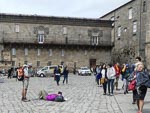
Today we made a short visit to Santiago De Compostela the end of the famous pilgrimage, Camino de Santiago, and the location of the shrine to St James the Great the reason for the pilgrimage in the first place. We arrived in Santiago mid afternoon and walked into the heart of the old city to find the place alive with people. Many were clearly "walkers" completing at least part of the Camino others just tourists like us come to look at the place and the walkers. The feeling of the place was definitely "if you are not a walker you are on the outer". But thats OK, many hiking towns and mountaineering towns have that same vibe.
...click/tap to read the full postViaducts in the rain (Colunga, Spain)
Journal entry for Sunday 30th Apr, 2017 (day 47, miles 73,046)
Today we started our trek along the north coast of Spain. It took a few miles out of Santiago but eventually we were traveling along the north coast on a relatively new motorway (built since the early 2000s) most of the day being spent on the A6. As it turns out much of the terrain along the coast is mountainous (or at least hilly) with valley followed by hill being a continuous pattern. The terrain was clearly a problem to the designers and builders of the new motorways as a new road that dropped down into these valleys and then climbed out again would not be the modern high speed road that was their goal. So the solution was ingenious and we presume expensive. Valleys are crossed by large, high and long bridges and often the hill on the other side is pierced by a tunnel, thereby creating a relatively level roadway out of very up and down terrain. We have not been able to find a reference to how many bridges (viaductos in Spanish) there are on this road but we did see a reference that claimed in one 16 mile section of the road there are 20 bridges and 7 tunnels. This is between Villafranca del Bierzo and Pedrafita do Cebreiro.
...click/tap to read the full postMountains and a challenging road (Potes, Spain)
Journal entry for Monday 1st May, 2017 (day 48, miles 73,157)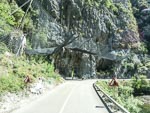
A bit of a change from the usual sightseeing diet today. Today was not old buildings, churches and squares but natural scenic 'wonders'. From Unquera on the A8 we took N621 which quickly turned narrow and twisting as it wound its way through La Hermida Gorge, a really pretty drive - but one that tested my skills as today happens to be 1st May, May-Day and a national holiday in Spain. So, the traffic on this narrow road was thick. However my challenge was dwarfed by that presented to the drives of the 40 foot tourist buses.
...click/tap to read the full postThe Guggenheim and a fantastic campsite(aires) (Bilboa, Spain)
Journal entry for Tuesday 2nd May, 2017 (day 49, miles 73,264)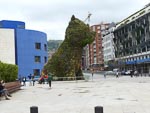
The motivation for going to the city of Bilbao was for us to visit the cities Guggenheim Museum but the campsite we chose turned out to be a bit of a feature as well, though a little more of that later.
...click/tap to read the full postA taste of Tapas (San Sebastian, Spain)
Journal entry for Wednesday 3rd May, 2017 (day 50, miles 73,337)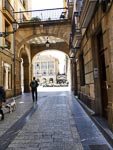
Today we made the short drive from Bilbao to San Sebastian and it became obvious quite quickly that we had entered Basque country. We no longer have any idea what the road signs are saying. After settling in to our chosen campground (this one is described as a campground - but more of that later) we ventured to the nearby bus stop and then into San Sebastian.
...click/tap to read the full post